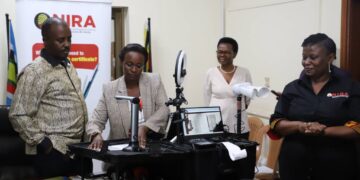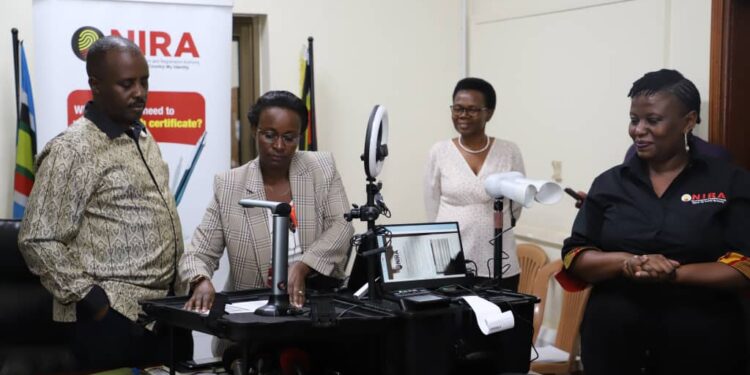Uganda’s National Identification and Registration Authority (NIRA) is set to revolutionize the country’s identification system with the introduction of iris scanning technology.
This innovative approach promises to enhance the accuracy and security of the national ID cards, ensuring that all citizens have access to essential services and participation in the democratic process.
The development was revealed during a joint press conference addressed by Gen David Muhoozi, Minister of State for Internal Affairs, and the NIRA Executive Director, Rosemary Kisembo, at the Ministry headquarters in Kampala on Friday.
The new system, to be launched in October, will enroll 17.2 million unregistered Ugandans and renew the national IDs of 15.8 million citizens. The inclusion of iris scanning technology is a significant upgrade, offering a high degree of accuracy and minimizing the risk of false acceptance or rejection.
This development is particularly significant for communities, who had faced challenges in accessing identification documents. The new system’s emphasis on inclusivity and accuracy ensures that all citizens, regardless of their background or socio-economic status, have an equal opportunity to participate in the country’s democratic processes.
Moreover, the integration of NIRA’s system with 90 institutions, including border posts, telecommunication companies, and banks, will facilitate seamless verification and validation of biometric and biographic data. This collaboration will enhance national security, streamline service delivery, and promote economic growth.
The government’s decision to extend the validity of existing national IDs by one year addresses concerns about the impending expiration of cards ensuring that citizens are not disenfranchised. This extension will provide a smooth transition to the new system, minimizing disruptions and anxiety among the population.
The commitment to continuous registration, even during the transition period, demonstrates dedication to inclusivity and accessibility. Citizens can still register for national IDs, replace cards, or apply for changes to their particulars at any NIRA office, ensuring that no one is left behind.
The upcoming mass enrollment exercise, set to commence in October, will be a landmark event in Uganda’s history. With the deployment of 13,000 personnel across 10,717 parishes, the government is demonstrating its resolve to ensure that all citizens have access to this critical identification document.
As Uganda prepares for the 2026 general elections, the significance of this project cannot be overstated. The accurate and secure identification of citizens is crucial for the integrity of the electoral process, and NIRA’s efforts will play a vital role in ensuring the credibility of the elections.
It’s important to note that Uganda’s National ID project is a shining example of innovation, inclusivity, and security. By harnessing cutting-edge technology and prioritizing citizen engagement, NIRA is setting a new standard for identification systems in Africa.
As the country moves forward, this project will undoubtedly have a profound impact on the lives of Ugandans, promoting equality, security, and economic growth.











